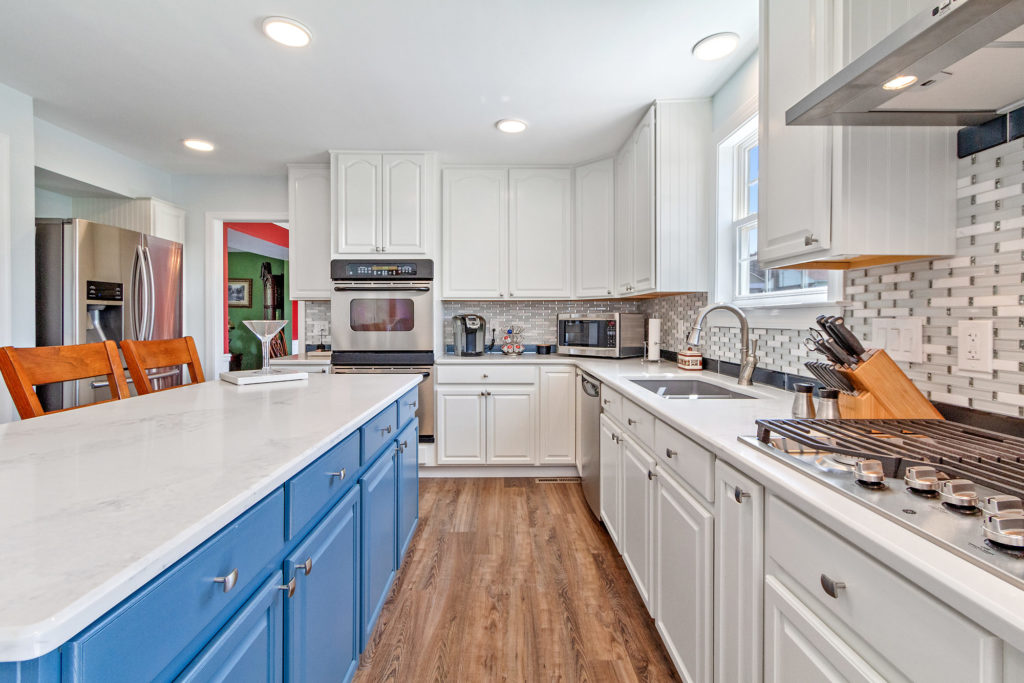By Carmine Pantano, Franks Marble & Granite
If youve been watching all those DIY and Home & Garden channels, been shopping for countertops yourself, or just talked with a friend who has recently been through a kitchen remodel, you have a good idea of just how many countertop material options there are today. For the most part, people in York County are choosing between granite and quartz. These two surfaces are favorites for their durability and easy-cleaning properties.
First, lets take a quick look at what granite and quartz are.
- Granite forms naturally deep underground – created as a result of the intense heat, pressure and ultimately the cooling of molten rock. It is removed in large slabs from deep below the earths surface and comes in a stunning array of colors and mineral highlights. Interestingly, granite contains the minerals quartz and feldspar, along with some others. After the slabs are removed from the earth and leave the quarry, they are cut and polished but are otherwise entirely natural.
- Quartz is one of the earths most well-known minerals. Though they are made up of 90% quartz, quartz countertops are humanmade. (Percentages can vary but are typically 90%, 93% or 95%). By blending quartz with resins, polymers and various pigments, a very durable and smooth artificial rock is created without any pores or cracks.
Both materials can go a long way in defining the look of a room, so personal style or preferences determine the ultimate choice between quartz and granite. Along with overall aesthetics, some practical considerations come into play when comparing the two.
Heres a quick review of the pros and cons of each so you can determine for yourself which countertop is for you.
Granite
Pro: It has a timeless appeal. Since quartz is relatively new as a countertop option, it hasnt had an opportunity to prove its longevity yet, but granite most certainly stands the test of time. It has a broad appeal, is an excellent selling point at resale time and has consistently demonstrated its value as a long-term investment.
Pro: Wide slabs are a plus. While it is available in a variety of shapes and sizes, finding granite slabs more than 70 inches wide isnt uncommon. On the other hand, quartz slabs are commonly found at about 56 inches and rarely larger than 65 inches wide. The fewer seams, the better when designing spacious kitchen areas with larger islands.
Pro: Granite is more economical. Ok, if youre pricing out exotic pieces (and there are many), this statement is not applicable! There are, however, more reasonably priced options for granite than for quartz and a much wider range of pricing options. An inexpensive granite option can range from $45-$65/ square foot installed as compared to at least $70-$100/ square foot for quartz. Naturally, a lot of the cost will depend on your surface area and if you have a lot of space to cover. The price difference adds up.
Pro: Its impressive and natural beauty. When comparing the appearance of granite and quartz, it comes down to personal preference. Since granite is naturally occurring, it will never be uniform. Depending on your tastes, that can be a pro or a con. The style and color choices, along with the dramatic patterns and textures are what makes granite so stunning and distinctive. No two slabs are the same. If you are one-of-a-kind and want your kitchen to reflect that, granite might be the right choice for you.
Con: Certain colors are porous. The biggest misconception is that all granite is porous and requires sealer on a yearly basis. This is not entirely true. The facts 90% of granite is too dense to accept sealer. Therefore, sealer does not affect 90% of the granite out there. That leaves us to discuss the other 10% that is a little softer and more porous. Some of the softer granite is susceptible to staining from water rings or spills that are not cleaned up quickly. Discuss sealer longevity with your fabricator, and they can tell you how often they recommend sealer to be applied. Spills are not typically an issue for quartz as it is manmade and nonporous.
Con: Styles can be inconsistent. Because of the natural veins, flecks and whirling motion in granite, it can be a struggle to find a clean and simple style. For many, this is part of its uniqueness and appeal, but if your preference is sleek, clean and uniform, quartz might be the answer to your needs.
Con: Its not perfectly smooth. Granite is 100% natural. There is no wax or coating on granite that gives it its shine. Its a grinding/polishing process that starts at a coarse grit and ends with fine grit that provides granite its shine. Any natural veins, pits, and other irregularities are common in granite, and you WILL be able to feel them. These cannot be sanded down and usually cannot be filled in.
Simply put, youre buying a piece of nature. Stand back and enjoy its beauty! Quartz is manufactured and will have a much smoother feel to it.
Granite photos:
Quartz
Pro: Its easy to maintain. Because quartz is a solid surface, its simple to clean and keep bacteria-free. It is tolerant of most detergents and requires no sealant. Do consult with your manufacturer on cleaning supplies, as some chemicals can negatively impact quartz.
Pro: Its durable. Believe it or not, quartz is stronger than stone. Because it isnt porous like granite, quartz is pretty resistant to scratches and stains. Many things that might cause concern with other materials like coffee, red wine, citrus juices, and oils, wont stain quartz. Quartz is also more flexible than granite, so even though its still incredibly heavy, it can be easier to install, which result in fewer worries about cracking during installation.
Pro: Its trendy. Possibly due to the low-maintenance and sleek appeal of quartz, many interior designers have started to favor quartz so its in high demand right now. Due to its rising popularity, quartz can also really deliver on its return on investment at resale providing you are purchasing for a reasonable price.
Pro: Its style is sleek and uniform. Though it does have the look of stone, a big selling point for quartz is its consistent, clean style. With so many design features to choose from today, consumers often get frustrated when trying to find cabinets, flooring, backsplashes, etc., that all work together. The unblemished elegance offered by quartz blends naturally with todays more contemporary design trends.
Pro: Colors that look like marble. In the past two years, quartz has come a long way and now offers countertop designs that look like marble without the marble maintenance. This is not a pattern that can be found with granite. If youre looking for the marble look without the marble maintenance, quartz is the only way to go.
Con: It can be costly. Durability, gorgeous sleek design and low-maintenance come at a cost. Quartz is specially engineered to deliver specific benefits and with anything made by humans, those who manufacture it control the price. Lower-End quartz can cost as much as level two granite. Granite offers a much wider range and selection under $65/ square foot installed, but you would be hard-pressed to locate a quartz countertop for that price.
Con: It is not the right choice for outdoor use. Remember how granite occurs naturally? Well, that is also why its naturally engineered to withstand the elements which quartz isnt designed for. Though quartz is made to be incredibly durable, it is not indestructible. Sunlight can cause quartz to fade or become discolored over time.
Con: Quartz slabs are cookie-cutter. Again, this is a matter of preference, but if youre looking for consistency, a predictable manmade surface wont have many variations.
Con: It is synthetic. Yes, quartz is manufactured to look real, but the fact remains that it is not straight from Mother Nature. Though manufacturers have made a lot of progress with creating colors and textures in quartz, it will never have the glorious natural beauty of granite.
Granite and quartz are likely the top two materials recommended for your kitchen and bathroom countertops. Your decision should be about which surface best suits your lifestyle and your vibe. There is no wrong choice just have fun choosing!
A note about daily maintenance: It is recommended that you clean both granite and quartz the same way – with a Ph-neutral natural stone cleaner. Wipe till dry, and your countertops will look beautiful for years to come. Avoid using a cloth or sponge from your sink as that will spread dirt and oils around. Soap and water will leave water spots and soap scum. Many over-the-counter cleaners especially those that claim to do more than one thing (clean & polish, clean & wax, clean & seal), are also not effective. These products wont do damage but will leave a dull film after use, and your countertops will require a little more cleaning with a proper cleaner.
Quartz photos:
Originally published in The York Builders Association’s 2018 issue of At Home in York Magazine. Photos included in this article demonstrate work by a variety of YBA members.



